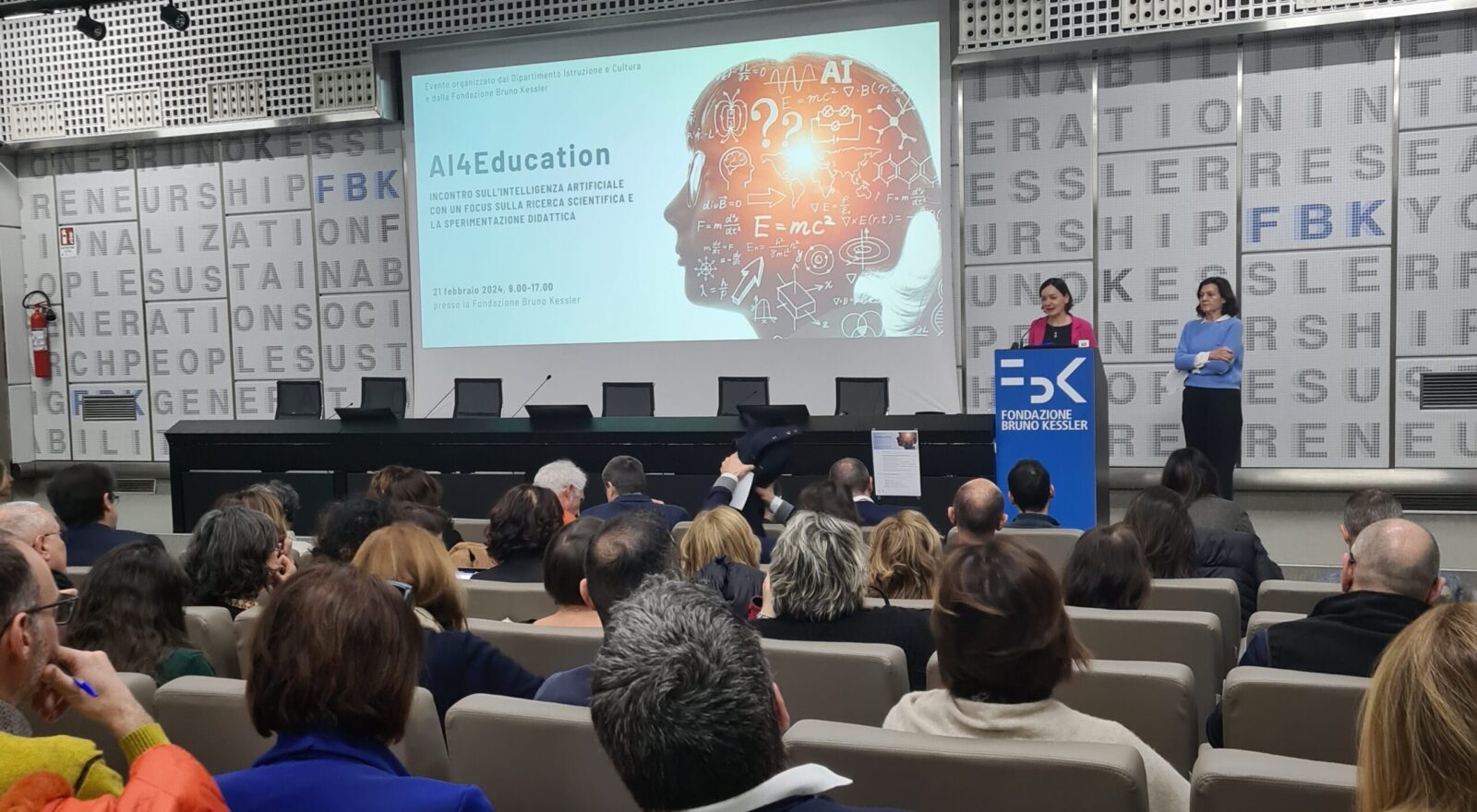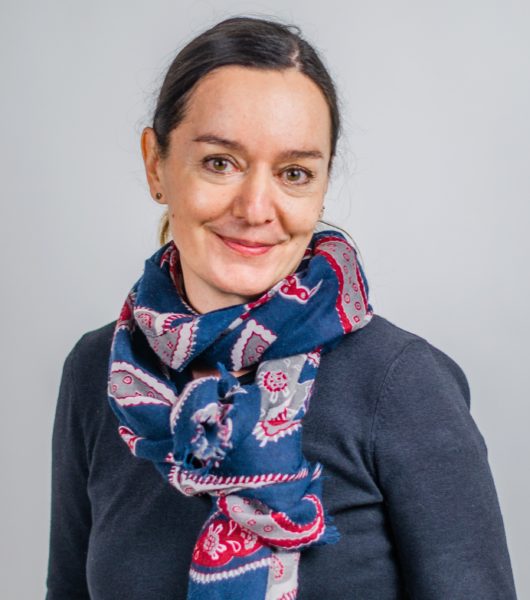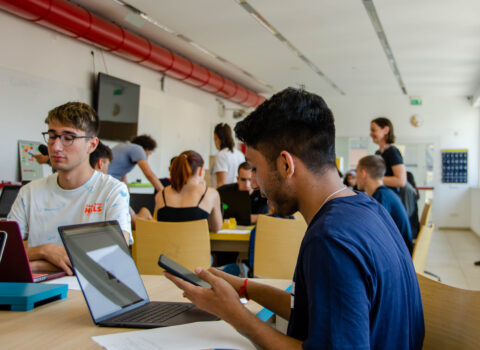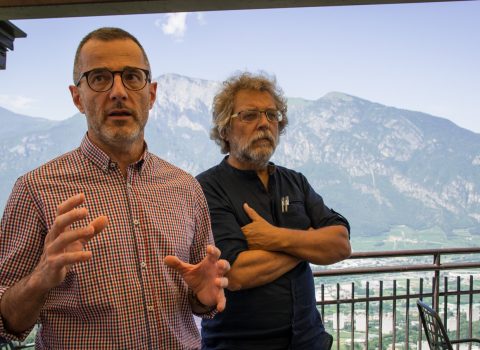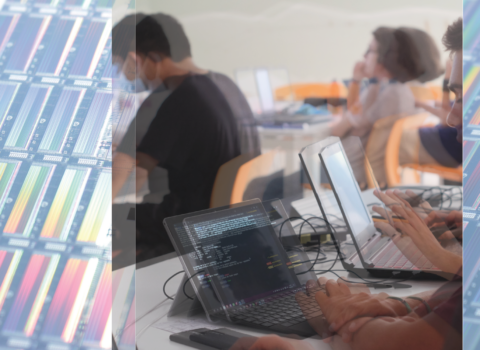
AI4Education
A meeting on Artificial Intelligence dedicated to high school teachers, with a focus on scientific research and educational experimentation
“AI4Education,” a first meeting on Artificial Intelligence dedicated to high school teachers, with a focus on scientific research and experimentation on teaching strategies organized by the Education and Culture Department of the Autonomous Province of Trento and Fondazione Bruno Kessler, was held on Feb. 21 in FBK’s Stringa Hall.
“Artificial intelligence”, said Vice President and Councillor for Education of the Autonomous Province of Trento Francesca Gerosa, “can be a very effective tool for supporting school systems. Just think of its possible applications to the student assessment system to identify weaknesses and strengths, but also to better understand kids’ gaps and implement targeted and timely support actions. At the same time, however, it is necessary to prevent this tool from being misused or abused. Therefore, a great effort is needed from everyone, to create an artificial intelligence culture, and the Province is in the forefront of this process to put in place the necessary regulations so that the whole world of education can make the most of artificial intelligence, understanding how it works, what its potential is but also its limitations.”
“With today’s meeting,” explained Claudia Dolci, head of the Scholars & PhD Program Unit at Fondazione Bruno Kessler, “we intend to start a discussion that will intercept the needs and urgent matters of schools and to assess how an institution like the Foundation can contribute to this. There is a clear need to design and develop pathways and teaching units that will integrate AI into school curricula, keeping in mind the complexity of the action since the new AI-related professions are not yet identifiable in terms of conventional teaching. We like to think of a school that connects with the world of research and work, and that is why we consider today’s meeting an important contribution to this goal, in which to invest with the participation of all entities in the area.”
During the morning session, which was also introduced by a greeting from Viviana Sbardella, PAT school superintendent, the experts covered the state of the art of research in this field and the possible impacts on education. The exchange of views focused on many aspects, such as AI perspectives and criticalities, the opportunities and limitations of generative AI in the world of education, the critical and responsible approach in the relationship with education, to the use of artificial intelligence as a support for foreign language learning.
The SHIFT training package was also presented, that was designed to integrate Artificial Intelligence into high school curricula and transmit the so-called data culture to kids. The project was co-funded by Fondazione Caritro and saw the collaboration of Fondazione Bruno Kessler, for scientific content, with Istituto Pavoniano Artigianelli per le Arti Grafiche, the project’s lead school. The result is a platform where video lectures, handouts, exercises and real projects are integrated for classes to experiment with.
The occasion also marked the opening of applications for the 2024 edition of WebValley, the summer school for the dissemination of interdisciplinary research that has been training teams of enthusiastic and motivated high school students, mentored by researchers, since 2001. This summer, in particular, a team of about 20 students, in collaboration with researchers from Fondazione Bruno Kessler, the University of Trento and the National Institute of Nuclear Physics (INFN), will undertake an exciting artificial intelligence-based project dedicated to the analysis of satellite data.
AI4Education lecturers will include Paolo Traverso (Director of Strategic Planning, FBK), Giuseppe Jurman (Data Science for Health, FBK), Gianluca Schiavo (Intelligent Interfaces and Interaction, FBK), Valeria Fabretti (Center for Religious Studies, FBK), Marco Matassoni (Speech Technology Lab, FBK), Stefano Bannò (Cambridge University Institute for Automated Language Teaching and Assessment), Luisa Bentivogli (Machine Translation, FBK), Alberto Garniga, lecturer in History and Philosophy.
The afternoon was dedicated to four parallel workshops in different areas (STEM, foreign languages, language and images, history and philosophy), in which teachers were able to experiment with researchers the contents seen in the morning through practical examples of applications for teaching.
